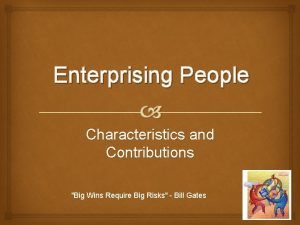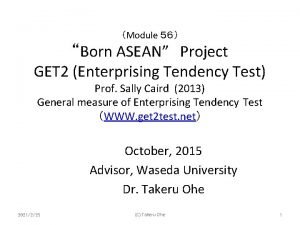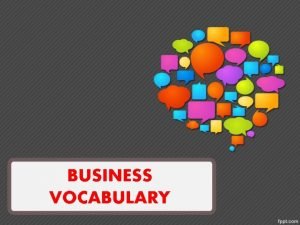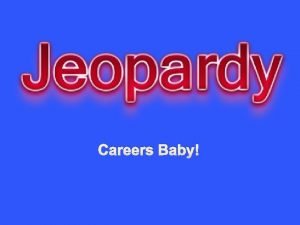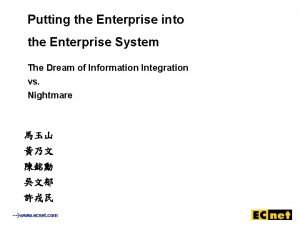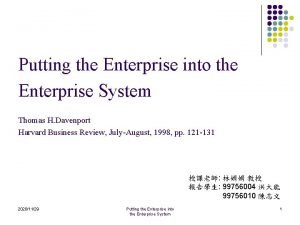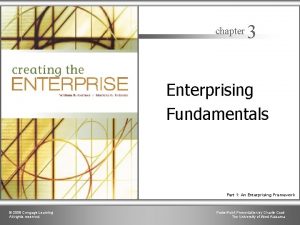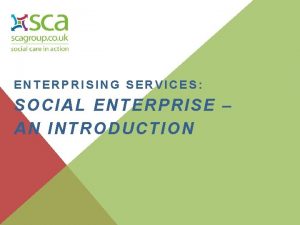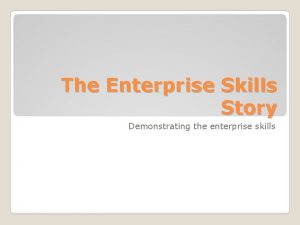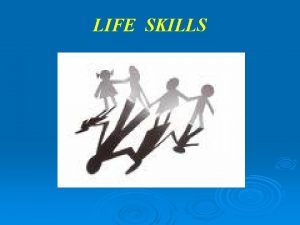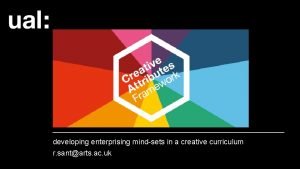Enterprise skills Are you Enterprising Enterprise skills Are










- Slides: 10

Enterprise skills Are you Enterprising?

Enterprise skills Are the skills and personal characteristics possessed by successful business people or entrepreneurs? Enterprise refers to the skills and knowledge possessed by entrepreneurs of a business. Anyone who owns a business needs to acquire and coordinate a range of resources-physical, financial, and human to ensure that the business is successful.

Self confidence & Motivation Ability to build teams and Inspire Risk taking Enterprising skills Ability To motivate Identifying & exploiting market opportunities

Enterprising behaviour • Tesco’s purpose is to serve its customers. • Tesco's organisational structure has the customer at the top. Tesco needs people with the right skills at each level of this structure. • There are six work levels within the organisation. This gives a clear structure for managing and controlling the organisation. Each level requires particular skills and behaviours.

The Times 100 Business Case Studies Tesco How training and development supports business growth

Introduction to Tesco • Largest British retailer – 2, 200 stores – Global net profits of around £ 3 billion • Wide diversified range of products – Includes grocery, electrical, banking services, mobile phones • 280, 000 employees work in varied roles – In-store – e. g. Customer Assistants, Department Managers, – Non-store – e. g. Warehouse Assistants, Logistics staff – Office-based at Head Office – e. g. Finance, Purchasing, Personnel, Marketing

Identifying training needs • Workforce planning evaluates staffing needs – Staffing levels required now and for future – Skills sets needed for new or vacated jobs • 9 Critical Success Factors to develop leadership potential – Customer focus – Working with others – Personal behaviour • 85% of manager appointments internal • 1 in every 10 employees takes part in development activities

• Training Personal Development Plans identify skills gaps • Needs filled by training – On-the-job for current job needs • E. g. shadowing, coaching, mentoring, job secondment – Off-the-job for specific skills • E. g. in team-building, communications, planning • A-level Options programme provides detailed induction training from outset

Development • Tesco and trainee share responsibility for personal development • Aims for long term competencies – More productive staff, more cost effective than recruiting new people • Development increases motivation • Options programme extends personal abilities – Activity plans, learning log, ‘Plan, Do, Review’ checklist – Increased responsibility and challenge

Evaluation of training and development benefits • SMART objectives can be measured • Feedback – 360 degree appraisal - from all contacts with employee – Formal and informal reviews • Colour coded ratings to show performance against targets • 3 things that employees are good at and 3 things they could do better
 Insidan region jh
Insidan region jh Difference between entrepreneurs and managers
Difference between entrepreneurs and managers Dr jane shaw
Dr jane shaw Enterprising characteristics
Enterprising characteristics How to be enterprising
How to be enterprising Enterprising tendency
Enterprising tendency It is defined as an organization or enterprising entity
It is defined as an organization or enterprising entity Conventional realistic investigative
Conventional realistic investigative Putting the enterprise into the enterprise system
Putting the enterprise into the enterprise system Putting the enterprise into the enterprise system
Putting the enterprise into the enterprise system Rain
Rain



